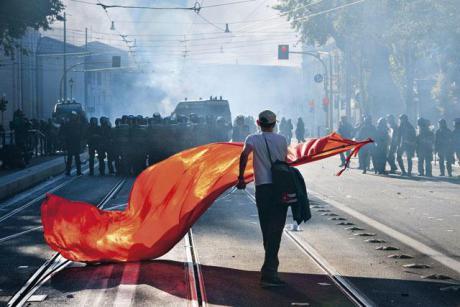2017-10-17
6 underrated Marxists who don't get enough love
It's a sad fact that many of the most radical
Marxists, whose participation in working class struggle and ideas
challenged not only capitalist society but also the social democratic
and Leninist tendencies in the workers' movement tend to get ignored by
anarchists and Marxists alike.
In this post we look at individuals who participated in working class movements from the 1918 German revolution to the 1945 Saigon Commune
to wildcat strikes in car factories in Detroit and contributed an
understanding of the events of their time that we can learn from today.
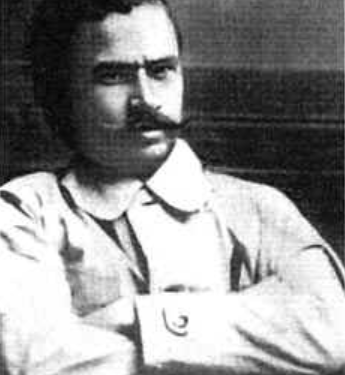
A participant in both 1905 and 1917 Revolutions as well as the Bolshevik underground, Miasnikov
gained a reputation as a hardened working-class militant, doing seven
years hard labour in Siberia for his activism and executing the Tsar's
brother himself. A member of the left communist fraction in the
Bolshevik Party, his expulsion led to the formation of the Workers Group and eventually a complete break with the Bolshevik ideology.
While still a member, he criticised the leadership for its
bureaucratisation and repression of working-class dissent both within
the party and wider society, saying, in a letter to Lenin: "while you
raise your hand against the capitalist, you deal a blow to the worker."
Miasnikov's view was that the Soviets should take over the running of
society, as they had been set up during the revolution through the mass
participation of the workers themselves. The party leadership and other
'left oppositions' within the Bolsheviks, were focused on the power of
the party and the trade unions rather than the class itself.
Expelled from the party, he set up the 'Workers Group' and published a
manifesto critical of the Bolshevik regime from Germany. In September
1923, during a strike wave in Russia, he was lured back on the pretense
he would not be interfered with, was immediately arrested on arrival and
exiled to Armenia, before escaping to France where he wrote 'The Latest Deception',
elaborating his theory of state-capitalism in the USSR, arguing it had
to be overthrown and replaced with soviet democracy. In 1945 he returned
to the USSR from France on a visa, but was arrested within a month by
secret police, and executed 16th November 1945.
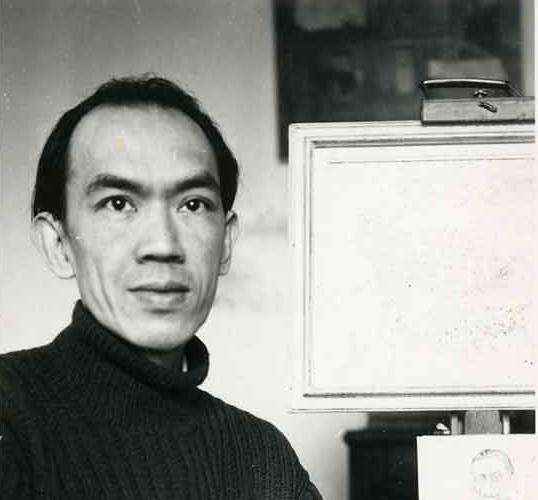
The life of Vietnamese Marxist Ngo Van Xuyet
takes us from the anti-colonial struggle in Vietnam, where he found
himself in conflict not only with the French authorities but also Ho Chi
Minh's Stalinist forces of 'national liberation', to the factories of
Paris during the 1968 uprising.
Starting work in Saigon's metal factories aged 14, Ngo joined the
Vietnamese Trotskyist movement five years later. Involved in various
struggles against French colonial rule, he was eventually imprisoned and
tortured for organising a strike at his factory. He organised hunger
strikes with other prisoners and later participated in the 1945 Saigon Commune
before leaving Vietnam in 1948 to escape both French colonial
persecution and possible assassination by Ho Chi Minh's forces (as
happened to several of his comrades).
Resettled in Paris and working in a factory making railway signals,
he broke with Trotskyism and the Leninist conception of the party,
mixing with anarchists, council communists and ultra-left Marxists. An
active workplace militant, he was involved in the Paris Metalworkers'
Liaison Committee and a participant in France's May 1968 revolt, writing
an excellent first-hand account from the point of view of a rank-and-file factory worker angry at the actions of the French Communist Party and CGT union to contain the rebellion.
Upon his retirement, Ngo dedicated himself to recording the struggles of the Vietnamese working class and peasantry against colonialism and independent from Ho Chi Minh's Stalinist national liberation movement as well as instances where the latter used violence against other sections of the Vietnamese revolutionary movement.
He also wrote an excellent autobiography documenting his amazing life
as a working-class militant across two continents called In the crossfire: adventures of a Vietnamese revolutionary.
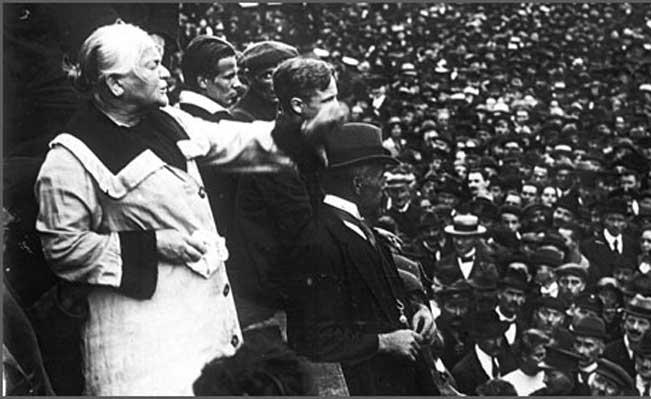
Clara Zetkin
was a central figure in the left-wing of German Social Democracy,
active in the Bookbinders and Tailors & Seamstresses Unions in
Stuttgart when it was illegal for women to be union members.
Zetkin broke with the mainstream of the Social Democratic Party in
1914 when she took a consistent anti-war position. She joined the
Spartacists with Rosa Luxemburg
and Karl Liebknecht, then founded the Communist Party of Germany with
them in 1918. While she completely broke with the Social Democratic
Party, she did not make the full break from social democracy to council
communism like the KAPD or AAUD-E, and lived in Russia from 1924 until her death in 1933.
Zetkin's work is notable for some of the earliest applications of
Marx's work in Capital to the women's question. She analysed the entry
of women and children into the labour market, and the development of
automation as undermining the wages and working conditions of both men
and the working class as a whole. However, she completely rejected male
chauvinist attempts to restrict the participation of women in the
workplace to preserve high wages, instead pointing out that the only
solution to a shorter working day and the full liberation of both men
and women was the overthrow of capitalism:
Just as the workers are subjugated by the capitalists,
women are subjugated by men and they will continue to be in that
position as long as they are not economically independent.[..] Women
workers are totally convinced that the question of the emancipation of
women is not an isolated one but rather constitutes a part of the great
social question. They know very clearly that this question in today's
society cannot be solved without a basic transformation of society.
[...] The capitalist system alone must be blamed for the fact that
women's work has the opposite result of its natural tendency; it results
in a longer work day instead of a considerably shorter one. [...] If
one demands the abolition or limitation of women's work because of the
competition it creates, one might just as well use the same logic and
abolish machines in order to demand the recreation of the medieval guild
system which determined the exact number of workers that were to be
employed in each type of work.
For the liberation of women (1889)
Unsurprisingly, her class analysis of women's issues meant she was
scathing in her criticisms of the bourgeios suffragettes, describing in
her 1903 text, 'What Women Owe to Karl Marx', that the 'sisterhood'
which "supposedly wraps a unifying ribbon around bourgeois ladies and
female proletarians" as bursting "like so many scintillating soap
bubbles."
Her account of discussions with Lenin
about the women's question show very effectively the limitations of
Lenin's politics in this regard, as he requested German communists focus
away from sex worker organising and 'the sex question' towards pure
party building.
In 1923, Zetkin penned an analysis of the rise of Mussolini in Italy
and the nascent fascist movement in Germany. In passages which
anticipate Dauvé's work
by half a century, she identifies the fascist movement as the last
resort of the bourgeiosie to maintain capitalist relations via open
violence against the working class and the consequence of the failure of
proletarian revolutions internationally, against the reformist
socialists who had blamed revolutionary attempts for the rise of
fascism.
The proletariat must have a well organised apparatus of
self-defence. Whenever Fascism uses violence, it must be met with
proletarian violence. I do not mean by this individual terrorist acts,
but the violence of the organised revolutionary class struggle of the
proletariat.
(Fascism, 1923)
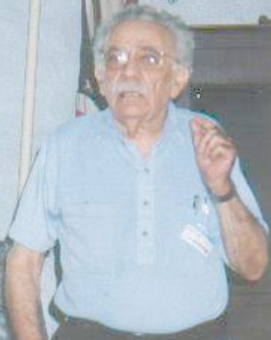
Martin Glaberman's great skill was presenting complex ideas in ways which relate to people's everyday experiences.
A worker in Detroit's car factories from the early 1940s to the
1960s, Glaberman started his political life as a Trotskyist, joining the
Johnson-Forrest Tendency, founded by (amongst others) legendary
Trinidadian Marxist CLR James.
By the 1950s, they had broken with Trotskyism, taking a more critical
position on the USSR and rejecting the need for a vanguard party to
seize power on behalf of the working class, and formed the
Correspondence Publishing Committee. Glaberman remained associated with
CLR James through the '60s via the Facing Reality Group in Detroit.
Glaberman's work is consistently rooted in the concrete experiences
of the working class: the relationship of union officials to rank and
file workers on the shopfloor, the relative strength of factories
dependent on their position in the production process. But his work is
never 'dumbed down'; rather, his down-to-earth explanations of complex
Marxist concepts lead seamlessly into practical politics. For instance,
in his article Unions and workers: limitations and possibilities, he says,
Quote:
Consider these two units of time: 36
seconds, the rest of your life. The job that takes 36 seconds to do that
you're going to do for the rest of your life. I don't know a better
definition of alienation than that
From here, Glaberman explains that it is that alienation "which is at
the root of working class resistance and working class struggle. It is
the kind of thing which is virtually impossible to measure [...]
Revolutions are made [...] by ordinary people with all the limitations
of the society, driven by 36 seconds for the rest of your life".
Glaberman also led a Capital reading group in Detroit with black autoworkers forming the executive committee of the League of Revolutionary Black Workers, an experience he mentions in The Workers have to deal with their own reality and that transforms them. He also wrote the fantastic book, Wartime Strikes,
about the wave of wildcat strikes by autoworkers following World War
Two in defiance of the 'No Strike' pledge signed by their union.
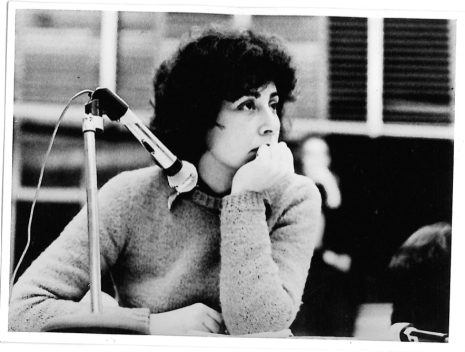
An argument often heard in Marxist (and anarchist) circles is that
feminism 'distracts' from the 'more important' issues of the class
struggle. Dalla Costa
shows why this is nonsense, setting out a highly original fusion of
Marxism with feminism and engaging in years of class-based feminist
activism both in Italy and internationally.
Born in Treviso, Northern Italy, Dalla Costa was active for many years with the Autonomist Marxist group Potere Operaio (Workers' Power) before founding Lotta Feminista
(Feminist Struggle), who not only challenged the sexism rife in Italian
society but also the workers' movement and radical extra-parliamentary
left. In 'The door to the garden: feminism and Operaismo', Dalla Costa describes how leaving Potere Operaia
was "a matter of dignity" as "the relation between man and woman was,
particularly in the environment of intellectual comrades, not
sufficiently dignifying".
Dalla Costa co-authored (along with Selma James) arguably Lotta Feminista's most significant text outlining their Marxist feminist analysis. In The power of women and the subversion of the community,
Dalla Costa demonstrated that, not only did women's domestic labour
reduce the cost of reproducing labour but also produced surplus value.
As such, Dalla Costa was the first of the Italian operaismo movement to
advance the idea that the extraction of surplus value could happen
outside the sphere Marx had designated as the direct process of
production, an idea which would become central to the
extra-parliamentary left in Italy.
Dalla Costa's pamphlet would become highly influential within the
international women's movement and in Italy she would be involved in
numerous feminist groups promoting 'wages for housework' and the
newspaper Le operaie della casa (The House Workers). In 2014, Dalla Costa donated a wealth of documents from her decades of activism to the Padua Civic Library,
which now holds the 'Archivio di Lotta Feminista per il salario al
lavoro domestico' (Archive of Feminist Struggle for the wages for
housework struggle).
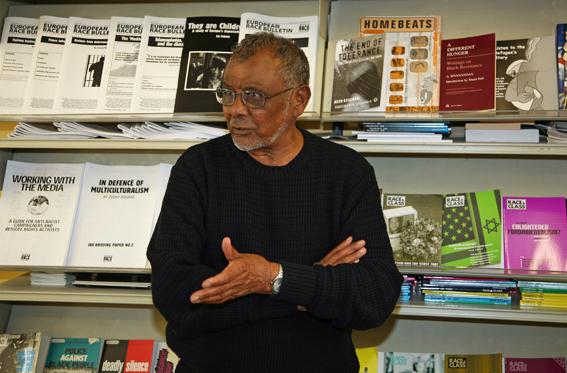
Born in Colombo, Sri Lanka, the son of a Tamil postal worker, Sivanandan
left the country after the anti-Tamil riots and pogroms of 1958.
Settling in the UK, he trained as a librarian, working in several public
libraries before being appointed chief librarian at the Institute of
Race Relations (IRR) in 1964.
In 1972, a major schism took place at the IRR: until then, the
organisation had been moderate and scholarly, attempting to address
‘race relations’ issues and advise government policy. However, a sizable
section of IRR staff (including Sivanandan) took issue with this
orientation and challenged the board to redress it. The majority of the
board resigned and the IRR reoriented itself towards supporting
community organisations and building a black-led anti-racist movement in
Britain. As Sivanandan, now the new IRR director, explained:
Quote:
We did not want to add to the tomes
which spoke in obfuscatory and erudite language to a chosen few, we no
longer believed in the goodwill of governments to listen to our reasoned
arguments. There was a whole lived experience – often not quantifiable
in surveys – of police brutality, racial violence, media distortion,
miseducation and marginalisation that it was now our duty to speak, if
not to, then certainly from.
Sivanandan took over as editor of the IRR's quarterly theoretical journal, Race, renaming it Race & Class
to highlight their interrelationship. The journal was intended to
inform activism, to encourage thinking "in order to do", linking "the
situation of black workers in Britain and the liberation struggles in
the underdeveloped world" with the aim of building an autonomous black
working-class politics in Britain (something often neglected in the
traditional left and trade union movements). He has also written widely
on racism, capitalism, police brutality and black anti-racist struggle in Britain, with many of those essays appearing in his book, Catching History on the Wing.
Libcom.org
Länk: https://libcom.org/blog/6-underrated-marxists-dont-get-enough-love-16102017

